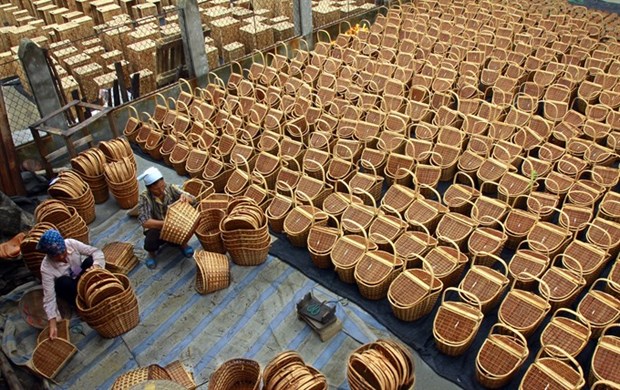SMEs’ productivity: Better, but still limited
Although Vietnam has focused on increasing labour productivity and overall productivity growth, there have been relatively few opportunities for small- and medium-sized enterprises (SMEs) to get customised support as they grow, said Max Bulakovskiy, policy analyst in Global Relations at the Organisation for Economic Cooperation and Development (OECD).
 Workers make handicrafts at Hien Luong Bamboo and Rattan Export Co Ltd in Phu Xuyen district’s Phu Tuc commune, Ha Noi(Photo: VNA)
Workers make handicrafts at Hien Luong Bamboo and Rattan Export Co Ltd in Phu Xuyen district’s Phu Tuc commune, Ha Noi(Photo: VNA)Hanoi (VNS/VNA) - Although Vietnam has focused on increasing labour productivity and overall productivity growth, there have been relatively few opportunities for small- and medium-sized enterprises (SMEs) to get customised support as they grow, said Max Bulakovskiy, policy analyst in Global Relations at the Organisation for Economic Cooperation and Development (OECD).
Bulakovskiy spoke during the Vietnam National Dissemination Seminar on the ASEAN SME Policy Index (ASPI) 2018 held on October 1 in Hanoi.
The OECD, the Economic Research Institute for ASEAN and East Asia (ERIA) and Vietnam’s Ministry of Planning and Investment co-organised the event with the aim of providing an overview of SMEs in terms of their contributions to employment and growth, and the specific challenges this segment faces in terms of productivity and working conditions.
During the event, experts from OECD and ERIA discussed examples of good practices from not only Vietnam, but also from ASEAN, and looked at a range of policy initiatives in place. They also provided policy recommendations which were identified for the country.
“The national Technology Development Progamme is one of the major mechanisms accessible for SMEs in Vietnam with a main focus on upgrading overall productivity. However, limited monitoring and evaluation of the existing programmes make it difficult to judge SME’s effectiveness and efficiency,” Bulakovskiy said.
“Vietnam has put a strong emphasis on promotion for R&D, especially on high-potential advanced technology linked to commercialisation. There are large initiatives promoting high-tech business incubation and development centres, but the country lacks policy co-ordination mechanisms in the area of innovation promotion,” he added.
Regarding the region, he said eight of the ASEAN member states offer both fiscal and non-fiscal incentives to promote productive agglomeration. Nine of the ASEAN nations have established national offices to deal with intellectual property.
Vietnam has not developed a national standard curriculum on entrepreneurship subjects and entrepreneurial learning (EL) elements are hard to disseminate at the primary education level, said Annie Norfolk Beadle, policy analyst in the Southeast Asia Division, OECD.
“The country has mostly relied on fragmented workshops and training sessions to scale up entrepreneurial skills among SMEs,” she said. “Vietnam should introduce a national curriculum on entrepreneurship in the national education system starting from the early stage.”
“It should also make entrepreneurship programmes for SMEs more systematic to meet the National Innovative Start-up Ecosystem programme’s objectives and provide better support for SMEs,” she said.
In the ASEAN region, some regional initiatives have emerged since 2014 to address the general lack of training programmes for EL in the region, for example the ASEAN SME Academy.
Half of AMS undertake background studies to ascertain entrepreneur training needs and around half have implemented initiatives in this area, she said.
Dionisius A. Narjoko, senior economist at ERIA, said SMEs in Vietnam have been blended with broader SME development programmes, for example in quality standards.
“But the country lacks of initiatives to help SMEs make better use of the country’s trade facilitation infrastructure,” he said, adding that it should introduce more SME-specific supports, especially in the areas where it is lacking the most, such as trade facilitation and quality standards.
Vietnamese policy-makers could consider developing a strategic national programme for integrating SMEs into global value chains and enhancing the use of e-commerce among SMEs, he said.
“SMEs are an important driver of job creation and economic growth in the ASEAN region. As the ASEAN Economic Community moves towards a higher level of market integration, new opportunities are opening up for these firms. The SME Policy Index is a tool to support policymakers in developing appropriate national and regional policies for SMEs to realise their full potential as drivers of job creation and economic growth,” said Nguyen Hoa Cương, deputy general director of the Agency for Enterprise Development under the Vietnam’s Ministry of Planning and Investment.
Encompassing the 10 ASEAN member countries, ASPI covers key areas of SME policy and builds on a set of policy indicators to measure the performance of participating economies in each of those areas.
The main objectives of the ASPI are to assess strengths and weaknesses of policy design and implementation in order to provide a list of priority actions for reform and provide a monitoring and evaluation framework for governments, the private sector and the donor community.
It also helps evaluate the status of implementation of the ASEAN Strategic Action Plan for SME Development 2016-2025 and helps enhance the capacity of policy makers to identify policy areas for future reform in accordance with best international practices.-VNA













